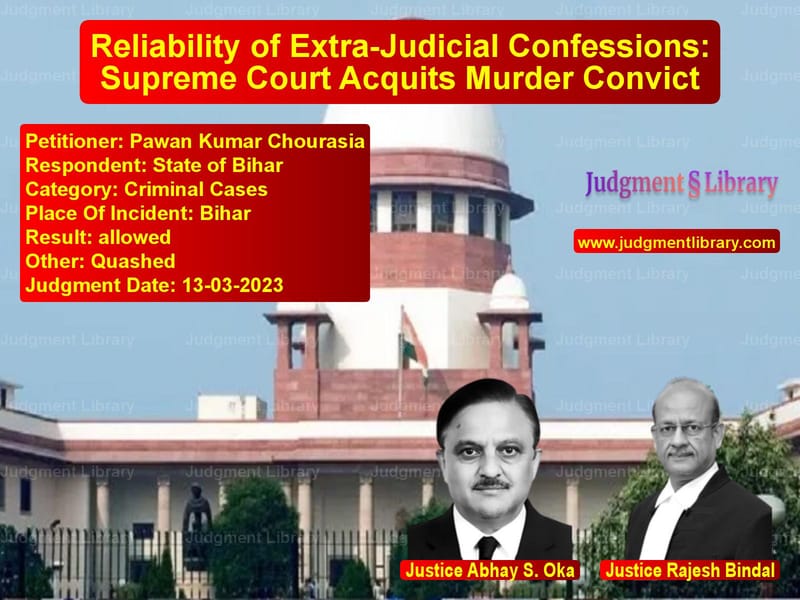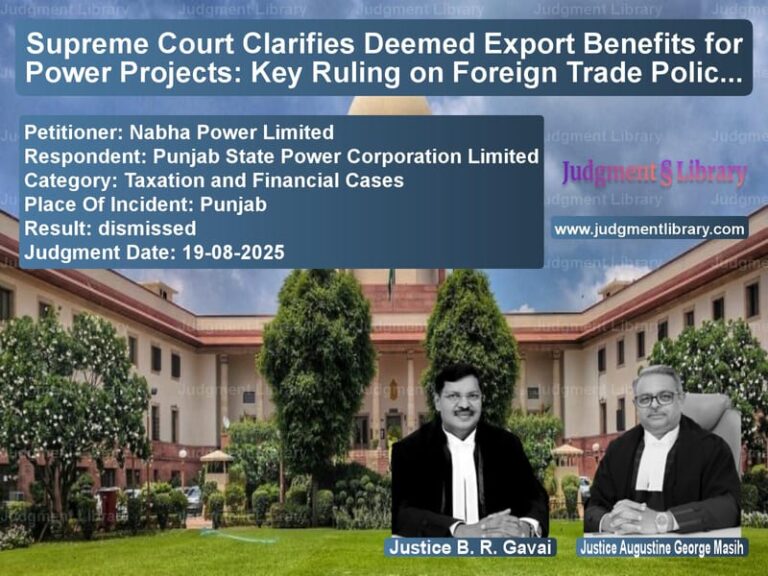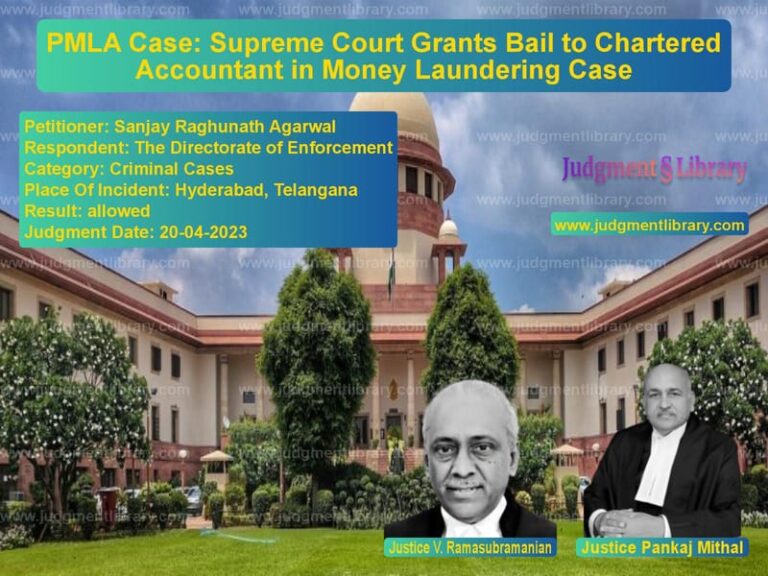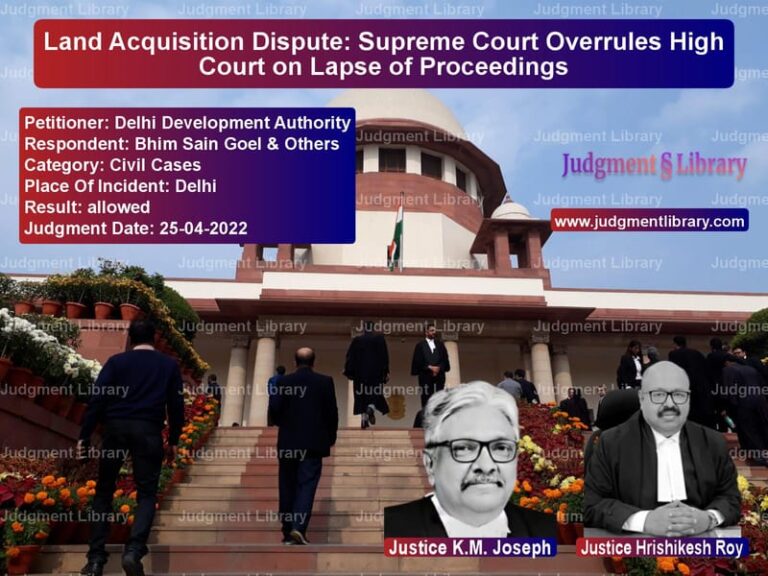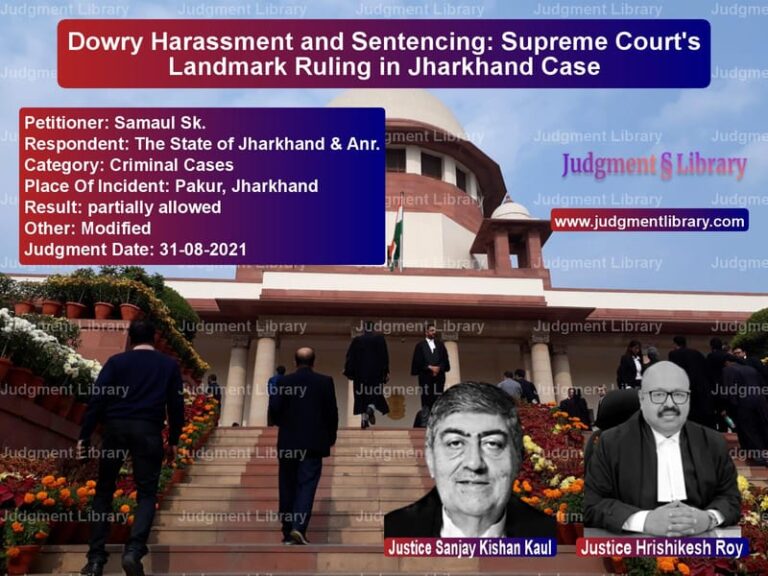Reliability of Extra-Judicial Confessions: Supreme Court Acquits Murder Convict
The case of Pawan Kumar Chourasia v. State of Bihar revolves around the crucial legal issue of extra-judicial confessions and their evidentiary value in criminal cases. The Supreme Court was called upon to determine whether the conviction of the appellant, based solely on an alleged extra-judicial confession, could be sustained. The case raises significant concerns about the reliability of such confessions and their admissibility as primary evidence.
Ultimately, the Supreme Court set aside the conviction and acquitted the appellant, citing inconsistencies in witness statements and lack of corroborating evidence. The judgment provides clarity on the legal standing of extra-judicial confessions and reinforces the principle that convictions must be based on strong, credible evidence.
Background of the Case
The appellant, Pawan Kumar Chourasia, was convicted for murder under Section 302 read with Section 34 of the IPC, along with four other co-accused. He was sentenced to life imprisonment. The case involved the alleged murder of Kamlesh and Bulla, two missing boys whose bodies were later recovered from a field.
The prosecution’s case was primarily based on an extra-judicial confession allegedly made by the appellant. However, the trial court’s decision relied on testimonies that the Supreme Court later found to be inconsistent and unreliable.
Arguments by the Parties
Arguments by the Appellant (Pawan Kumar Chourasia)
The appellant, through his legal counsel, argued:
- The entire case against him was built upon an extra-judicial confession, which is considered a weak form of evidence.
- None of the independent witnesses provided credible testimony supporting the prosecution’s version.
- Several key witnesses, including the complainant, turned hostile and did not support the prosecution’s case.
- There was no forensic or circumstantial evidence linking the appellant to the crime.
- The alleged extra-judicial confession was extracted under coercion and lacked voluntariness.
Arguments by the Respondent (State of Bihar)
The prosecution countered the appellant’s arguments, stating:
- The extra-judicial confession was voluntarily made and had led to the discovery of the victims’ bodies.
- Even though some witnesses turned hostile, others supported the prosecution’s case.
- The appellant had led the police and the complainant to the crime scene, which proved his involvement.
- As per judicial precedents, a conviction can be based on an extra-judicial confession if it is corroborated by other evidence.
Supreme Court’s Legal Analysis
Evidentiary Value of Extra-Judicial Confessions
The Supreme Court analyzed whether the extra-judicial confession made by the appellant was voluntary, truthful, and reliable. The Court observed:
“As far as extra-judicial confession is concerned, the law is well settled. Generally, it is a weak piece of evidence. However, a conviction can be sustained on the basis of extra-judicial confession provided that the confession is proved to be voluntary and truthful.”
The Court reiterated that extra-judicial confessions must be corroborated by independent evidence and that the reliability of such confessions depends on the person to whom it is made.
Inconsistencies in Witness Statements
The Court noted that:
- Several key witnesses, including the complainant, turned hostile and did not support the prosecution’s version.
- There was no explanation regarding the source of information that led to the alleged confession.
- One of the prosecution witnesses, PW-8, claimed to have heard the confession days before the bodies were discovered but failed to report it to the police.
- Another witness, PW-9, gave conflicting statements regarding how the bodies were recovered.
Failure to Establish Voluntariness
The Supreme Court emphasized that an extra-judicial confession must be made to a person in whom the accused has implicit faith. In this case, the Court found:
- The appellant was not closely associated with the witnesses to whom he allegedly confessed.
- The confession was allegedly made in front of multiple people, which is highly unusual for a voluntary admission of guilt.
- The prosecution failed to prove that the confession was made without coercion or inducement.
Final Judgment by the Supreme Court
The Supreme Court ruled:
- The extra-judicial confession was unreliable and could not form the sole basis for conviction.
- The prosecution failed to establish the case beyond a reasonable doubt.
- The High Court and trial court had erred in relying solely on the confession without corroborative evidence.
- The conviction of the appellant was set aside, and he was acquitted of all charges.
- The appellant’s bail bond was discharged.
Impact of the Judgment
The ruling establishes critical legal principles:
- Extra-judicial confessions alone cannot be the basis for conviction unless they are voluntary, reliable, and corroborated.
- Courts must scrutinize witness testimonies carefully, especially when key witnesses turn hostile.
- Procedural fairness must be maintained, and confessions must be proven to be voluntary.
- Failure to present credible independent evidence weakens the prosecution’s case.
Conclusion
The Supreme Court’s decision in Pawan Kumar Chourasia v. State of Bihar reinforces the principle that extra-judicial confessions must be treated with caution. The judgment ensures that convictions are based on solid and corroborated evidence, upholding the fundamental right to a fair trial.
Petitioner Name: Pawan Kumar Chourasia.Respondent Name: State of Bihar.Judgment By: Justice Abhay S. Oka, Justice Rajesh Bindal.Place Of Incident: Bihar.Judgment Date: 13-03-2023.
Don’t miss out on the full details! Download the complete judgment in PDF format below and gain valuable insights instantly!
Download Judgment: pawan-kumar-chourasi-vs-state-of-bihar-supreme-court-of-india-judgment-dated-13-03-2023.pdf
Directly Download Judgment: Directly download this Judgment
See all petitions in Murder Cases
See all petitions in Judgment by Abhay S. Oka
See all petitions in Judgment by Rajesh Bindal
See all petitions in allowed
See all petitions in Quashed
See all petitions in supreme court of India judgments March 2023
See all petitions in 2023 judgments
See all posts in Criminal Cases Category
See all allowed petitions in Criminal Cases Category
See all Dismissed petitions in Criminal Cases Category
See all partially allowed petitions in Criminal Cases Category

